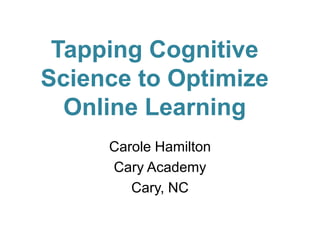
Tapping brain science to improve online learning
- 1. Tapping Cognitive Science to Optimize Online Learning Carole Hamilton Cary Academy Cary, NC
- 4. Cognitive Science Tells Us That Students Need To 1. 2. 3. 4. Re-Learn Just Prior to Forgetting (Bjork 2011) Start with a Question (Williams, 2012) Build Mental Analogies (Hofstadter, 2003) Explain and Defend Concepts (Jackson, Dukerich, Hestenes, 2008; Williams 2012) 5. Transfer Knowledge (Willingham, 2002) 6. Engage in Metacognition (How People Learn)
- 5. 1. Re-Learn Just Prior To Forgetting “As we forget…when things are presented again, we get a larger increase in storage strength. So…forgetting, rather than undoing learning, creates the opportunity to reach additional levels of learning.” Robert Bjork, 2011
- 6. 2. Start with a Question “There is substantial evidence that students can learn far more by trying to answer questions themselves (than by receiving the answers), or by being pushed to construct explanations (rather than be provided with them).” Joseph Jay Williams 2009
- 7. 3. Build Mental Analogies “Analogy…simply pervades every tiny nook and cranny of cognition, it shapes our every thinking moment. Not seeing that is like fish not perceiving water.” Douglas Hofstadter
- 8. 4. Explain and Defend Concepts “Since students systematically misunderstand most of what we tell them… the emphasis [must be] placed on student articulation of the concepts.” (Jackson, Dukerich, Hestenes, 2008)
- 9. 5. Transfer Knowledge “What turns the inflexible knowledge of a beginning student into the flexible knowledge of an expert seems to be a lot more knowledge, more examples, and more practice.” (Daniel T. Willingham)
- 10. 6. Engage in Metacognition “In research with experts who were asked to verbalize their thinking as they worked, it was revealed that they monitored their own understanding carefully, making note of when additional information was required for understanding, whether new information was consistent with what they already knew,, and what analogies could be drawn that would advance their understanding.” How People Learn
- 11. How Does Online Learning Stack Up?
- 13. 1. Re-Learn Just Prior To Forgetting “As we forget…when things are presented again, we get a larger increase in storage strength. So…forgetting, rather than undoing learning, creates the opportunity to reach additional levels of learning.” Robert Bjork, 2011
- 14. 2. Start with a Question “There is substantial evidence that students can learn far more by trying to answer questions themselves (than by receiving the answers), or by being pushed to construct explanations (rather than provided with them).” Joseph Jay Williams
- 15. 3. Build Mental Analogies “Analogy…simply pervades every tiny nook and cranny of cognition, it shapes our every thinking moment. Not seeing that is like fish not perceiving water.” Douglas Hofstadter
- 16. 4. Explain and Defend Concepts “Since students systematically misunderstand most of what we tell them… the emphasis [must be] placed on student articulation of the concepts.” (Jackson, Dukerich, Hestenes, 2008)
- 17. 5. Transfer of Knowledge “What turns the inflexible knowledge of a beginning student into the flexible knowledge of an expert seems to be a lot more knowledge, more examples, and more practice.” (Daniel T. Willingham)
- 18. 6. Engage in Metacognition “In research with experts who were asked to verbalize their thinking as they worked, it was revealed that they monitored their own understanding carefully, making note of when additional information was required for understanding, whether new information was consistent with what they already knew,, and what analogies could be drawn that would advance their understanding.” How People Learn
- 19. What Else Technology Can Offer • Adapt Dynamically to Student Learning Rate and Style • Track Productive Time on Task • Assess Mastery of Material • Reinforce Concepts, not Just Content
- 21. Further Reading Bjork, Robert. “The Theory of Disuse and the Role of Forgetting in Memory.” http://gocognitive.net/interviews/theory-disuse-and-role-forgetting-human-memory Go Cognitive. 2011. Donovan, M. Suzanne . Et al. How People Learn: Bridging Research and Practice. 1999. W. Pellegrino, EditorsHofstadter, Douglas. “Analogy at the Core of Cognition.” http://prelectur.stanford.edu/lecturers/hofstadter/analogy.html 2001. Jackson, Jane, Dukerich, Larry, and Hestenes, David (2008). Modeling Instruction: An Effective Model for Science Education, Science Educator 17(1): 10-17. http://www.nsela.org/images/stories/scienceeducator/17article7.pdf Williams, Joseph Jay. How Can Cognitive Science Improve Online Learning?, 2012. http://www.youtube.com/watch?v=VKW5lZqBWgI Willingham, Daniel T. “Inflexible Knowledge: The First Step to Expertise.” American Educator. Winter 2002. http://www.aft.org/newspubs/periodicals/ae/winter2002/willingham.cfm web1.caryacademy.org/facultywebs/ carole_hamilton
Notas do Editor
- Mental schemas are needed because it makes the learner active sense-maker, instead of passively recipient. It becomes part of the learner’s world view.
